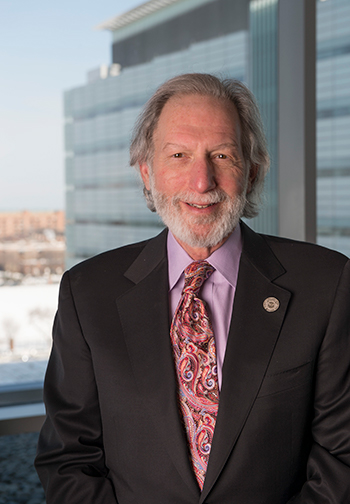As Michael H. Silverman, MD’73, moves into his second year as president of the Medical and Biological Sciences Alumni Association, he plans to build on what he’s learned during year one and to continue enhancing the association’s many activities. Read more about how he initially got involved, why the Alumni Council is relevant, his advice to new members, and more.
 How would you describe your first year as president?
How would you describe your first year as president?
I’ve genuinely enjoyed being part of the Alumni Council, which is the governing body of the Alumni Association. We have significant potential to foster meaningful alumni engagement and to provide new and valuable services for our students. I’ve developed a deep appreciation of the valuable things we do and the benefits we as alumni can transmit. It’s important for us to recognize that the people who come behind us are contributing to our legacy. When they succeed, we all benefit. That’s one of our core philosophies and guiding values.
It’s also extremely gratifying to see our colleagues devote so much time and energy to select nominees out of a very rich talent pool for the Distinguished Service Awards. The alumni we recognize each year send a powerful message of not only what we value and what accomplishments we celebrate, but also who are appropriate role models for our current crop of students.
What are you looking forward to in your second year as president?
In terms of the Distinguished Service Awards, we’re trying to make them even better, and have recently established an ad hoc committee to make the process even more representative of our various constituencies. We want to present a portfolio of awardees that truly reflect the MBSAA community.
Another area I’m also very interested in personally is enhancing programs that can benefit current students. I became involved with this a few years ago when I was invited to be the chair of the Chicago Partners Committee, which is charged with developing and administering programs that connect alumni with students. There’s still much opportunity to enhance our visibility and interaction among both Pritzker and BSD students. Right now, the Chicago Partners Committee has launched a pilot program focused on mentoring opportunities and activities, which will give students an opportunity to connect with alumni who can advise them on career or geographic choices, or a variety of professional pathways.
What is the Alumni Council and why is it necessary?
The Alumni Council is the governing body of the Alumni Association and now has 35 members who meet three times a year. We had our first meeting of fiscal year 2017 earlier this month, which was a special occasion for a couple reasons. First, we welcomed new members. Second, this was the first time where we’ve implemented all changes to the Bylaws that have been made in the past three years. I was privileged to have led the effort to review and revise our Bylaws when I was vice president, so it’s gratifying to see the changes being implemented. As with the Distinguished Service Awards, there has been particular focus on making our leadership reflective of our constituency. We not only welcomed our new members, but now have installed members in new categories that may not have been formally acknowledged in the past.
Specifically, we now have two medical students, two students from the Division of the Biological Sciences, and two residents of the medical center as members of the Alumni Council. This is the first time we’ve had such a broad, young representation, and that’s the direct result of updating our Bylaws. We’re also delighted to have a new member of the Alumni Council who did not attend Pritzker or the BSD, but instead is an alumna by virtue of the fact that she was a resident of the medical center. Initiatives such as these can only expand our relevance, our reach, and our roles as ambassadors of our very special institution.
What is your advice to new members, student representatives, or those not involved?
We would love to have new members and student representatives on our committees. There are a diverse set of opportunities for participation, and in addition we need your input regarding ideas, programs, and possibilities for improvement.
For those not involved, we encourage you to look for opportunities to be engaged. Attend local meetings, and please consider attending your next Reunion on a five or ten-year anniversary; if you’ve not already done so. I think you’ll be pleasantly surprised at how enjoyable they are. Please consider volunteering and opening up your house for the Residency Interview Hosting program, which is a great example of something that is very low impact for an alum but extremely high impact for a student. I hope to see you all at upcoming events!

